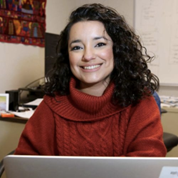Africa Flores-Anderson
 Speaker: Africa Flores-Anderson, Ph.D. Candidate, McGill University
Speaker: Africa Flores-Anderson, Ph.D. Candidate, McGill University
Presentation: “Earth Observation's Potential for Environmental Management”
Bio: My research focuses on advancing the detection of forest change in tropical areas using multiple satellite resources, including Synthetic Aperture Radar (SAR) and optical satellite data. The main objective is to strengthen forest monitoring systems by improving the timing and accuracy of forest change detection. My research will expand our understanding of the types of deforestation that SAR and optical datasets can detect and how these two different types of satellite sensors can complement each other to improve forest change detection.